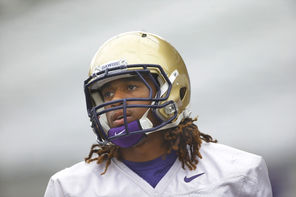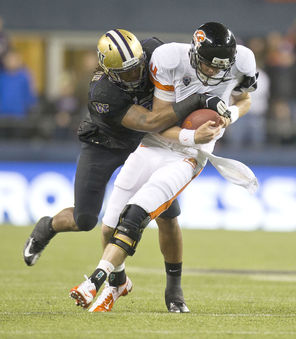Originally published August 23, 2013 at 12:08 PM | Page modified August 24, 2013 at 8:06 PM
Shaq Thompson, UW coaches expect even more this season
Shaq Thompson came to Washington as a heralded recruit. He lived up to the hype his freshman year and expects to be better as a sophomore.
Seattle Times staff reporter
Mark Harrison / The Seattle Times
Shaq Thompson started all 13 games as a true freshman, and coaches are expecting even more this season from the heralded recruit.
DEAN RUTZ / The Seattle Times, 2012
Shaq Thompson gets to Oregon State quarterback Sean Mannion during a strong freshman season.

Justin Wilcox has built a strong UW defense.
Shaq Thompson file
Position: Linebacker.
Height, weight: 6-2, 230
Year: Sophomore
Hometown: Sacramento
2012: Started all 13 games for the Huskies as nickel back. Intercepted three passes, made 44 unassisted tackles, 30 assists. Named Huskies’ freshman of the year, honorable mention All-Pac-12, second-team freshman All-America.
![]()
Shaq Thompson arrived on campus just more than a year ago as the Huskies’ most-celebrated recruit in a decade. He did nothing to dissuade the lofty expectations, starting all 13 games on defense and earning honorable-mention All-Pac-12 recognition as a true freshman last season.
Washington defensive coordinator Justin Wilcox said Thompson, after shifting from safety to outside linebacker in August 2012, has a better understanding of his assignments now. And while Wilcox is confident Thompson will be better in 2013, he’s also cautious not to overstate the sophomore’s capabilities.
“You gotta temper it a little bit,” Wilcox said of the hype surrounding Thompson.
Linebackers coach Peter Sirmon isn’t so cautious. Thompson, Sirmon said, “can be as good as this place has seen in a long, long time.”
Temper that.
“He survived on pure ability last year,” Sirmon said. “Now he actually knows what he’s doing.”
Thompson, too, is expecting more from himself after finishing with 74 tackles, three interceptions, two sacks and 8.5 tackles for loss last season.
“I came in not knowing anything,” he said. “I came in like a lost child (who) didn’t know where to go. This year, I’m way more comfortable. I know my assignments on defense; I know what I’m supposed to do on every call.”
After spending a year in the Boston Red Sox minor-league system, Thompson gave up baseball this year, opting to stay in Seattle for most of the summer to train.
“I just felt like I needed to stay here with my teammates,” said Thompson, who earned a reported $45,000 signing bonus from the Red Sox in 2012. “It was the best choice for me. … I missed football.”
Thompson didn’t add any weight in the offseason — he’s still right around 230 pounds — but Sirmon has noticed a difference after a full year in UW’s strength and conditioning program.
“He’s in a lot better physical shape,” Sirmon said. “He’s not getting the little dings like he had with his groin or his feet or his ankle; he’s a more complete athlete now.”
Thompson, naturally quiet and reserved, is also trying to be a complete leader. “Be more vocal,” he said of his goals. “And be more of a playmaker.”
Sirmon has also noticed progress in Thompson’s leadership.
“He’s such a great kid, and a guy who we can build this program around,” Sirmon said. “He’s got a great personality, and even though he’s not a boisterous guy, he’s going to do what’s necessary for the team.”
Washington coaches haven’t completely shut down the idea of using Thompson on offense at some point or, more likely, on special teams. He had two kickoff returns last season, notably the last one in the final minutes of the MAACO Bowl Las Vegas against Boise State.
“Hopefully a lot,” Thompson said, when asked how much he’ll play on special teams. “But, you know, we got more athletes and everybody has to get on the field. And if they can help us on special teams, they can help us on special teams. I’m not a big complainer if I don’t get on special teams.”
There were, however, no indications on the field early in training camp, when practices were open to the media, that Thompson would have a role on offense.
“That’s not really that big of a deal to me because I know we have tremendous weapons on offense,” he said. “I have faith in them.”
So there’s no baseball, and no apparent plans to incorporate him into the offense. For now, at least, Thompson will stick with what he does best, which is just about everything on defense.
His combination of size and speed means he can load up close to the line to stop the run, or line up opposite the slot receiver in coverage.
“He’s doing a lot of stuff; he’s covering, he’s blitzing, he’s playing the run, pass. We try to put him in a lot of spots,” Sirmon said. “If there’s a better way to feature him, we’ll definitely try to explore it.”
The linebackers appear to be the strength of the defense. Junior John Timu in the middle, and sophomores Travis Feeney and Thompson on the outside are returning starters (though Princeton Fuimaono is currently running ahead of Feeney).
“All three of us need to set a high expectation for ourselves and for the linebacker group and for the whole defense,” Thompson said. “We could be one of the best defenses in the Pac-12 if we all do our own assignments, pick each other up when we hit adversity and just keep going.”
| Huskies defense, by the numbers | ||
| Washington was much improved last season defensively, the first year for new coordinator Justin Wilcox. Here’s how the Huskies stacked up compared to other Pac-12 teams the past two years (all games). | ||
| Category | 2012 rank, by the numbers | 2011 rank, by the numbers |
|---|---|---|
| Scoring defense | 4th, 24.2 points per game | 11th, 35.9 points per game |
| Total defense | 4th, 357.4 yards per game | 11th, 453.3 yards per game |
| Rushing defense | 5th, 160.1 yards per game | 9th, 168.7 yards per game |
| Passing defense | 2nd, 197.3 yards per game | 11th, 284.6 yards per game |
| Pass defense efficiency | 5th, 115.4 efficiency rating | 7th, 137.5 efficiency rating |
| Interceptions | 5th, 17 INT, 204 return yards | 8th, 10 INT, 51 return yards |
| Sacks | 10th, 27 sacks, for 145 yards | 7th, 28 sacks, for 188 yards |
| First downs allowed | 2nd, 18.4 per game | 9th, 22.8 per game |
| Opponent 3rd-down conversions | 7th, 37.1 percent converted | 12th, 49.2 percent converted |
| Turnover margin | 6th, plus 5 (33/28) | 5th, plus 1 (23/22) |
| Red-zone defense | 10th, opponents scored 86 percent | 10th, opponents scored 90.2 percent |
Adam Jude: 206-464-2364 or ajude@seattletimes.com. On Twitter: @ajude.















